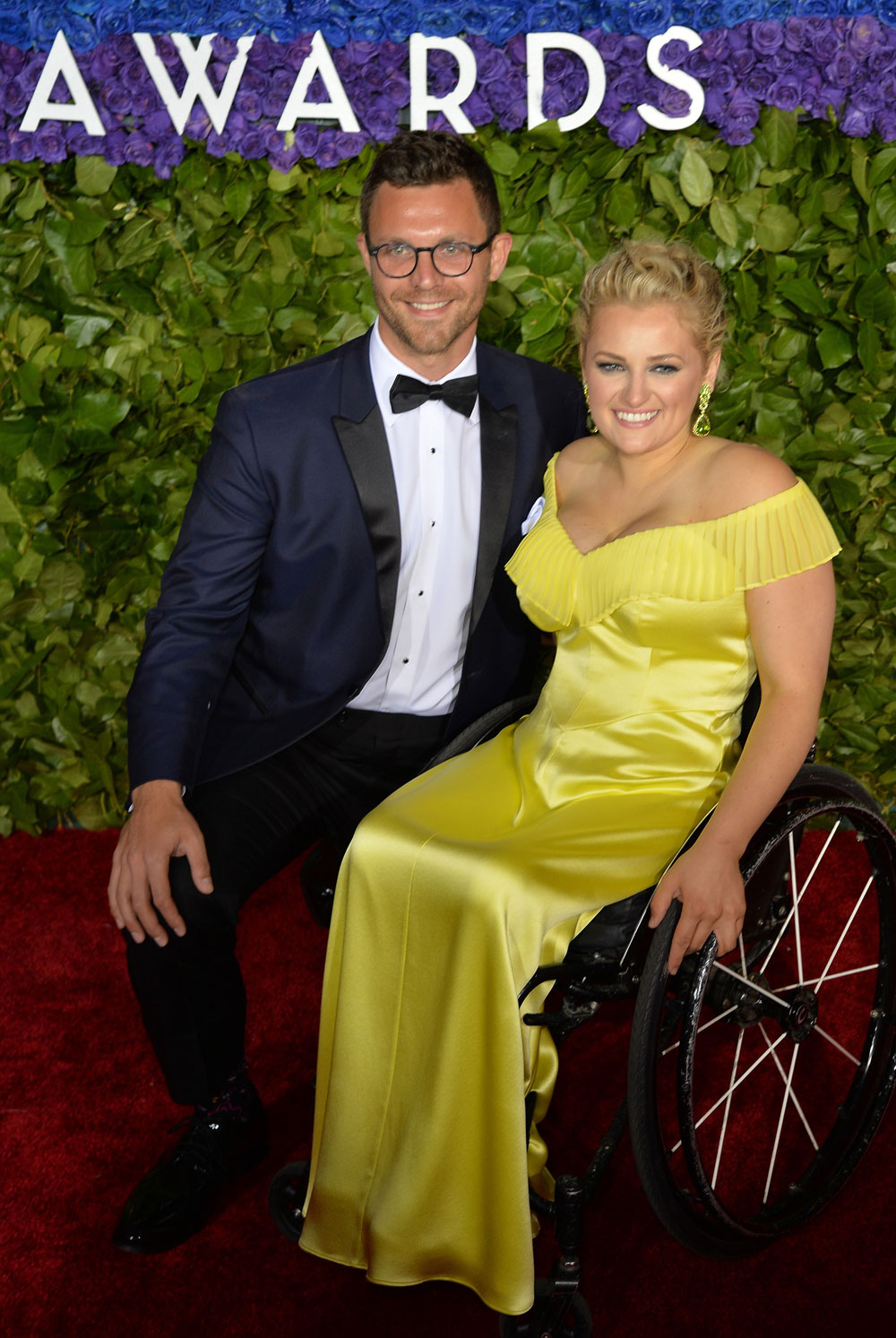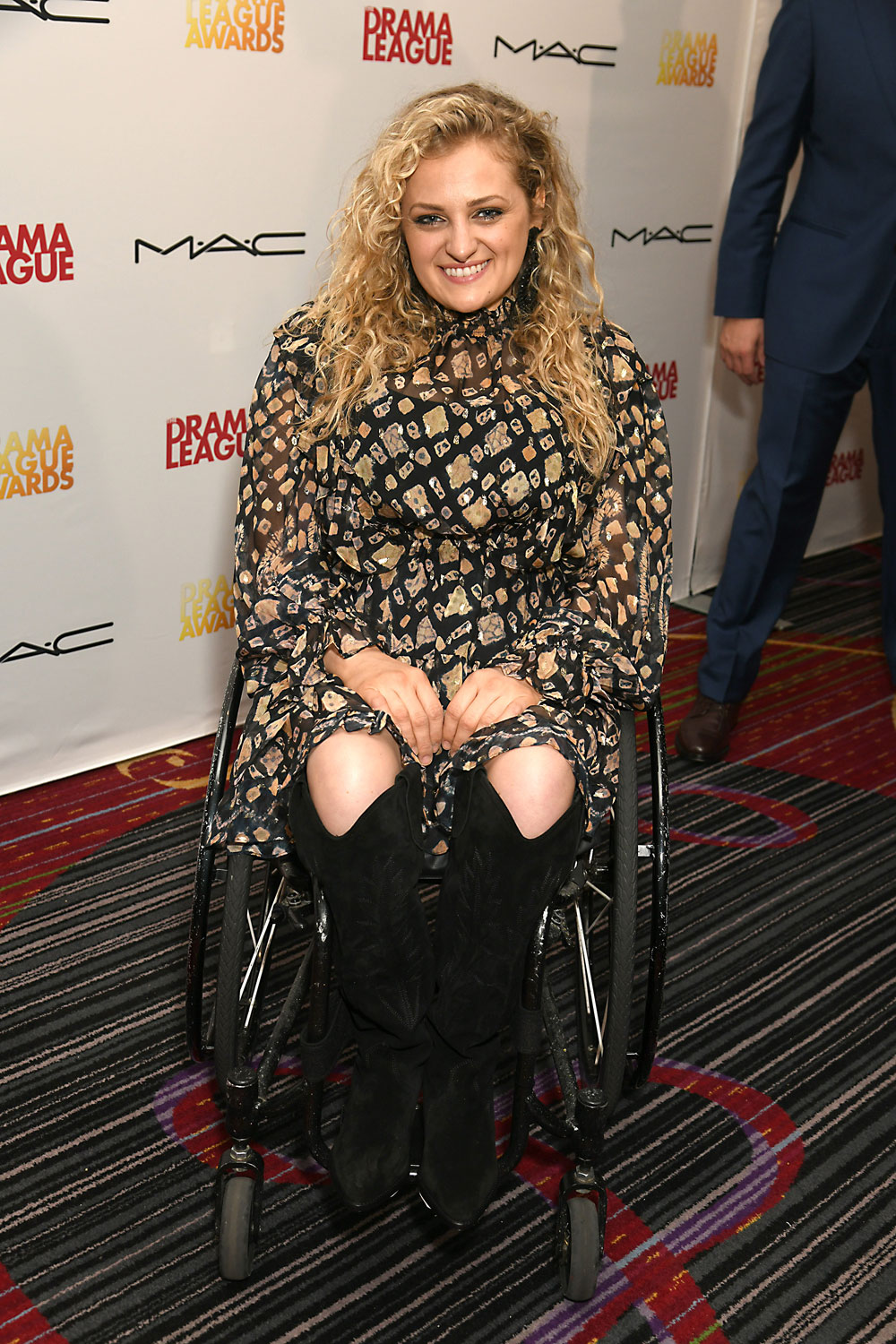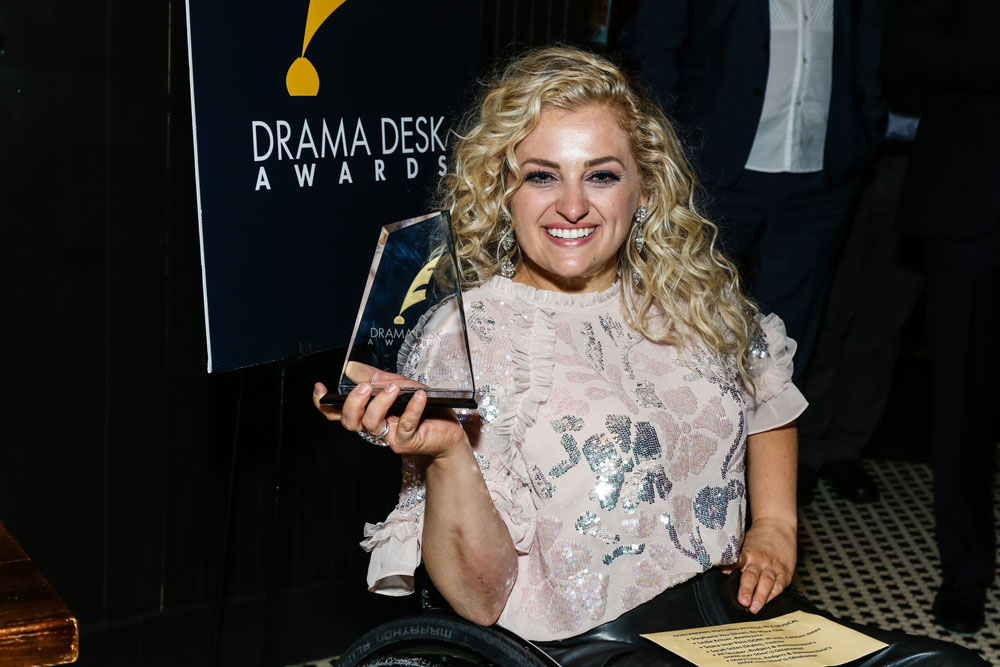
The 73rd Tony Awards aired Sunday night. Musical Hadestown garnered the most awards, 8, including a win for Rachel Chavkin, for Best Director of a Musical. One of the most-talked about winners is Ali Stroker, who became the first wheelchair user to win a Tony. She won the award for Best Featured Actress In A Musical for playing Ado Annie in the revival of Rodgers & Hammerstein’s Oklahoma! Ali had been sitting backstage while the nominees were announced, and then wheeled herself onstage, where she was greeted by applause and a standing ovation. Ali began her acceptance speech by thanking everyone and then continued:
This award is for every kid who is watching tonight who has a disability, who has a limitation or a challenge, who has been waiting to see themselves represented in this arena — you are.
In their write up of Ali’s win, The NY Times included a conversation they had with her last month. Ali talked about the importance of representation:
“I’m very aware that when I was a little girl I wasn’t seeing anybody like me, and on days when I’m exhausted or discouraged about something, that lights a fire… I hope that for young people in chairs who feel that this is too hard, that they see that being in a chair is like getting a secret key to an unknown door — that they see what I’m doing and are reassured that anything is possible.”
I’m so happy for Ali, and yes, for all of the children (and adults!) who have disabilities who see themselves when they look at Ali, who might now think, “I can perform onstage, too.” As a disability scholar and advocate, I am so pleased at Ali’s win (yay!)
Some people in disability circles are discussing accessibility, which is something Ali mentioned post-win, though she doesn’t specifically mention the producers of the Tonys or Radio City Music Hall. She said “I would ask theater owners and producers to really look into how they can begin to make the backstage accessible so that performers with disabilities can get around.” She also spoke more about this issue a few days ago with the L.A. Times.
Ali was backstage because there was no ramp to the stage that would allow her to wheel herself up onto it should she win. The lack of a ramp also prevented her from joining her fellow cast and crew onstage when Oklahoma! won the Tony for Best Revival of a Musical. A friend who has connections to the theater in New York and I have been talking about this today, and the bottom line is that representation matters, and it goes hand-in-hand with accessibility, Many people don’t think about or choose to ignore accessibility because it requires intentional work. A ramp could have been constructed, but it was not. Modifications for accessibility in a space help all of the people in that space. Everyone can use a ramp, and if you’re walking around in stilettos, it’s probably a safer option than stairs. (Jennifer Lawrence’s trip-and-fall at the Oscars is one of my worst nightmares.) Workarounds such as the one made for Ali are nice, and, even more so, responsible, but they miss the point. She was still unable to have the experience of other winners—to go up onto the stage from the audience for her win, and for her show’s win. Constructing a temporary ramp would not have been a tall order.
Photos credit: Getty, WENN and Avalon.red













I didn’t realize how limiting some places were and never really understood the difficulties of people in wheelchairs till I started pushing a baby stroller around. That really opened my eyes to the deplorable access for wheelchairs in so many public places. Yay to Ali
Same, but it was after my dad had a stroke and was in a wheelchair for four years.
My oldest daughter is in a wheelchair and yeah, it’s is really frustrating to get around even with our wheelchair that is more like a stroller. There is only one big grocery store in the area I know of that has one cart for children with disabilities who cannot sit without a back support and a harness and I’ve seen it being used by someone whose child clearly doesn’t have an issue sitting up or someone who doesn’t even have a child when there are plenty of carts available. Don’t even get me started on accessible public changing spaces for children or adults with disabilities. There are virtually none so you either don’t go out, change your child on a bathroom floor, or go all the way back to your vehicle to change. I could go on and on by lack of accessibility or courtesy but it’s early and I already have a headache.
I do love that she won though and loved her speech, brought tears to my eyes.
I remember her from season 2 of The Glee Project! She was lovely, fun, super confident and talented AF. I always knew she’d go far!! Also, her bf is hot.
I worked with Ali on her school musicals when she was much much younger. (I’m about 8 years older) She has always been lovely and so super talented. Her journey has been so amazing to watch. She earned it and I can’t think of anyone more deserving.
It took me forever to figure out where I recognized her from! I’m so happy that she has been so successful.
I would say I’m surprised someone didn’t think ahead about the problem with access to the stage, but I’m not. The recital hall at my school is also really lacking in accessibility. There is no ramp access to the stage, no room for a wheelchair in the audience, and the elevator for the space is on the other side of the building. We have students with physical limitations who obviously have difficulty getting on the stage. Any suggestions on how to approach this with the administration?
If your school is in the United States and is a public school, you could probably slap them with the Americans with Disabilities Act which covers physical accessibility of programs and structures.
It all depends on how old the building is and how recently it was renovated. The ADA was passed in 1990 – buildings older than that have different rules, which all depend on when/if they were/are being renovated.
My guess is that the stage at Radio City is so high off the orchestra floor that a wheelchair safe ramp would have been impossible to build in the space available. A lift could have (and should have) been installed at the edge of the stage (but the cost of installing it for one day & timing were possible issues).
All of the Broadway theaters were built before the 1990s and most have not been fully renovated since then either, meaning the ADA doesn’t necessarily apply. It’s easier (and profitable) to make the front of the house accessible – a ramp over the two or three steps into the building and removing a few seats in the orchestra to make room for wheelchairs is all it took for most of the older theaters. Bathrooms are, as always, a bigger problem.
The back of the house is where space is at a real premium, particularly at stage level. I’ve been backstage at a few Broadway theaters (we have friends & relatives who are professional pit musicians). They are rabbit warrens of dressing rooms and storage areas. Installing a wheelchair accessible dressing room & bathroom at stage level or installing an elevator would be a massive challenge in most of them and impossible in a few (they would have to move the exterior walls of the building into the street or the building next door to expand the wings).
I was recently backstage at one theater where part of the orchestra pit was actually under the street and the music was piped in to the theater. Getting into the main pit meant climbing behind racks of costumes and what appeared to be a computer mainframe. And that was one of the biggest Broadway theaters, where the front of the house is accessible. I wouldn’t want to be the architect challenged with making that space wheelchair accessible without either dramatically reducing the size of the stage or expanding the building into the sidewalk.
I agree Liz that unfortunately most buildings aren’t covered under ADA because of the year of construction but TeamAwesome was referring to her school, which is a whole other set of guidelines, specifically under Title II. Depending on what kind of school ADA may still apply. If government funding is accepted, most of the time Title II must be adhered to, which includes making programs accessible to all students, which I think may include a recital hall.
It is a community college, so yes, we accept federal funds. It is also one of the oldest buildings on campus. I have mentioned the lack of access to our student disability coordinator and she said, oh, I’ve never thought about it. Before these students who need help navigating the campus, she had never been in our building.
There is no “grandfather clause” in the ADA.
I work in a college library, and when the administration was considering renovations, the architect told me that it has to do with the percentage of the building being renovated in terms of having to bring things up to code with ADA. I believe the number he mentioned was 20% of the building being renovated (or more, of course) before a school is legally required to bring everything up to spec for accessibility.
Edit to add: Since there is technically an elevator to the space, you would have to make a pretty good argument to your administration, I think. Even if it’s not convenient, it counts. I would start nagging the accessibility coordinator, seems like that should be their job, not yours!
So thrilled she won! Lovely acceptance speech.
Oldest child in a wheelchair at times and using canes at times – accessibility is a mess in most places. Even just doors are a problem. Think about how hard it is for someone in a wheelchair to open a manual door and keep it open while he or she then tries to get through. Wheelchair seating is awful in so many places. And I hate the whole time and money excuse, especially here. She was nominated weeks ago and you have some of the best set designers in the world preparing for the Tonys. If they couldn’t figure it out, they shouldn’t be allowed to work on Broadway.
I have a disability and noticed right away that she wasn’t able to sit among her peers when her name was called. The thing about accessibility that a lot of able-bodied people don’t understand is that it really isn’t enough to have a “special wheelchair section” in a theater or to make accommodations for someone (like having Ali backstage with only per plus one instead of her entire cast waiting for her name to be called). Accessibility should mean that people with disabilities are able to experience things as closely as possible to people who are able-bodied. We really don’t WANT special treatment. We want to be able to have a normal experience. It was so incredibly wrong for them to not build a ramp for her. It would’ve been so easy.
I was attending a conference for work and saw a session on accessibility, and the presenter pretty much framed it as, “I mean, I know it’s a lot of time and money, but we should try to make things more accessible if we have money left over in the budget.” It was such a jarring and disheartening thing to hear — that MAYBE companies will consider making spaces more accessible to me, if they have the money.
Huge congrats to Ali — she’s an incredibly talented performer and fantastic role model.
I saw her in Spring Awakening and she was awesome. Way to go Ali.